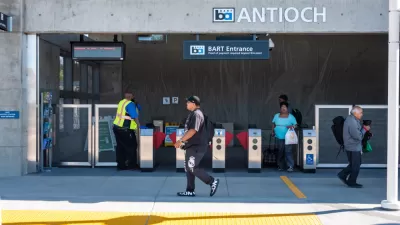California's high-speed rail project is in fact going to be built despite the state's looming budget crisis, but many are beginning to question what kind of impact the project will have if the right development around train stations is not met.
Being cash-strapped, however, leaves little room for the state to focus on transit-oriented development, which many believe would be a key to it's success. Experts cite what is referred to as the BART syndrome, where Bay Area Rapid Transit stations are often left without high-density development in close range, thus making little impact in reducing sprawl and car use.
According to Gabriel Metcalf of the San Francisco Planning and Urban Research Association, "the environmental benefits of rail will be lost if there isn't development around the stations, which are currently planned for both dense urban centers [Los Angeles and San Francisco] and more sprawling cities like Gilroy, Fresno and Bakersfield."
Thanks to Shay Kahen
FULL STORY: Will High-Speed Rail Get Sick with BART Syndrome?

Maui's Vacation Rental Debate Turns Ugly
Verbal attacks, misinformation campaigns and fistfights plague a high-stakes debate to convert thousands of vacation rentals into long-term housing.

Planetizen Federal Action Tracker
A weekly monitor of how Trump’s orders and actions are impacting planners and planning in America.

In Urban Planning, AI Prompting Could be the New Design Thinking
Creativity has long been key to great urban design. What if we see AI as our new creative partner?

King County Supportive Housing Program Offers Hope for Unhoused Residents
The county is taking a ‘Housing First’ approach that prioritizes getting people into housing, then offering wraparound supportive services.

Researchers Use AI to Get Clearer Picture of US Housing
Analysts are using artificial intelligence to supercharge their research by allowing them to comb through data faster. Though these AI tools can be error prone, they save time and housing researchers are optimistic about the future.

Making Shared Micromobility More Inclusive
Cities and shared mobility system operators can do more to include people with disabilities in planning and operations, per a new report.
Urban Design for Planners 1: Software Tools
This six-course series explores essential urban design concepts using open source software and equips planners with the tools they need to participate fully in the urban design process.
Planning for Universal Design
Learn the tools for implementing Universal Design in planning regulations.
planning NEXT
Appalachian Highlands Housing Partners
Mpact (founded as Rail~Volution)
City of Camden Redevelopment Agency
City of Astoria
City of Portland
City of Laramie





























